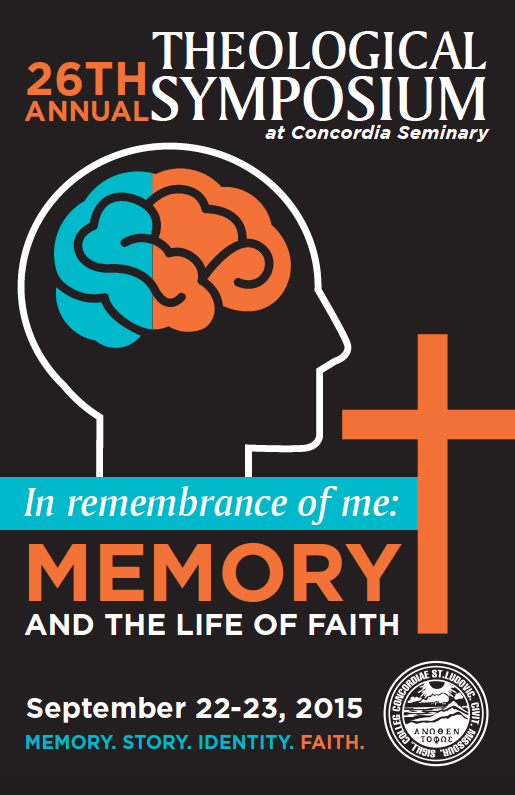 Since the first day of this year’s Theological Symposium will be focused on the latest brain research on memory and identity (led by experts in the field), Day 2 will feature Concordia Seminary professors and focus on the theological and practical implications of memory, identity, and community for the church. The sectionals are divided into three areas. Participants can either take part in all of the sectionals in a given “track” or dabble in all three (some of the presenters have already provided summaries of their sectionals…see below).
Since the first day of this year’s Theological Symposium will be focused on the latest brain research on memory and identity (led by experts in the field), Day 2 will feature Concordia Seminary professors and focus on the theological and practical implications of memory, identity, and community for the church. The sectionals are divided into three areas. Participants can either take part in all of the sectionals in a given “track” or dabble in all three (some of the presenters have already provided summaries of their sectionals…see below).
Track 1: The Biblical and Theological Dimensions of Memory
“When God Remembers” — Paul Raabe
Dr. Raabe asks, “why do the biblical authors speak of God remembering?” Is God getting forgetful? Is he developing amnesia? This sectional will help you overcome any sense of embarrassment so that you may respond properly to such biblical language.
“Remembrance as Reception: The Lord’s Supper in the Pauline Tradition.” — Mark Seifrid
(Prof. Seifrid is new to the Concordia Seminary faculty and a renowned scholar in Pauline studies. Read more about him here).
Dr. Seifrid will address the idea of memory in the Bible as memory of a divine deed that is not absent but present.
“Memory in the Fathers: Memoria Sui – Memoria Dei” — Joel Elowsky
Dr. Elowsky will explore one of the most interesting aspects of memory in the fathers, namely, “memory” as the tradition passed down, as well as simply the practice in the early church of memorizing the Scriptures and how this affected their theology and church practice.
Track 2: Pastoral Care and Ministry
“Grieving as a Neurological Activity” — Bruce Hartung
Dr. Hartung will apply current brain research to pastoral, diaconal and compassionate care activities. He argues that grief is not something to get over; it is something to be honored and constructively utilized.
“To Forgive is Not to Forget” — Mark Rockenbach
“Ministering to Alzheimer’s Patients” — Richard Marrs
Dr. Marrs and Rev. Jeff Sheer will explore how pastors and chaplains can provide faithful soul care (seelsorge) to those with dementia, and to their families.
Track 3: Congregational Mission and Ministry
“Catechesis and Memory” — Jason Broge
“Zikkaron: Liturgical Remembrance and Christian Identity” — Tony Cook
“Helping People Remember the Sermon Beyond the Parking Lot” — Glenn Nielsen
Registration is now open. For more information, and to register online, go to the Theological Symposium web page, or contact the Office of Continuing Education at [email protected] or 314-505-7286.

Leave a Reply
You must be logged in to post a comment.